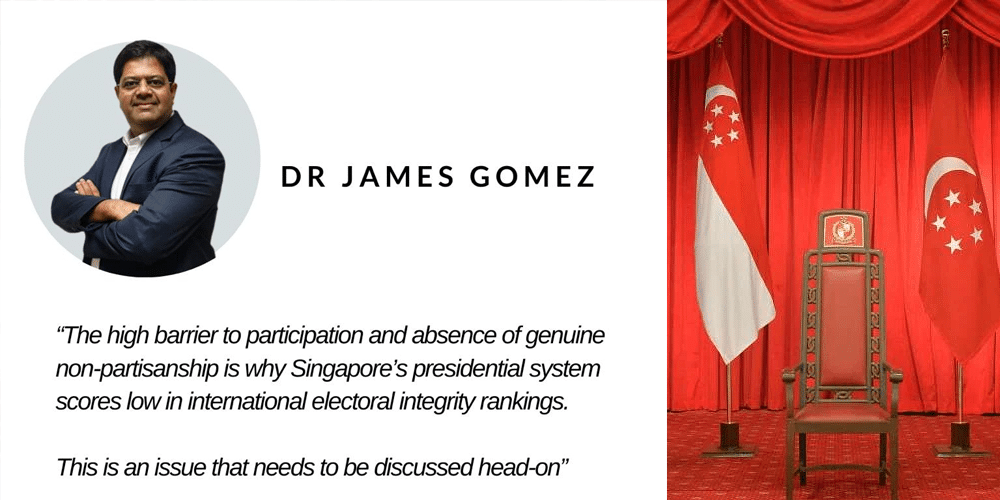by Dr James Gomez
Global electoral indicators show that elections in Singapore are administratively free and fair. However, the existence of barriers and structural disadvantages are key reasons why Singapore scores low in democracy rankings.
Electoral integrity is achieved when international standards are met in national election practices, aiming to ensure free and fair elections. This forms the foundation of a robust democratic system.
Fundamental factors that determine electoral integrity include regular and periodic elections, ballot secrecy, universal suffrage, holding elections that are free and open to all contenders, and establishing free and fair campaign rules that enable voters to make informed choices.
V-Dem, a Swedish-based institute that examines the qualities of government, awarded the following scores for the sub-indicator “elections free and fair” during the years when Singapore held presidential and general elections.
All scores range between 0 and 4, where 0 means that elections are fundamentally flawed, and 4 means that there might be some unintentional errors in the electoral process that did not impact significantly the election:
This data shows that, although there might have been certain administrative shortcomings, these did impact the tabulation of the final result of the elections to elect a president since the first electoral cycle in 1993. The decline in the 2017 presidential election is important to note. In that election, the rules required all candidates to be ethnic Malays, leading to accusations of exclusion against other contestants from non-Malay backgrounds.
Moving from electoral administration to electoral integrity, the following data is extracted from V-Dem’s “electoral democracy index”, which looks at electoral laws, policies, as well as free and open media, and provides a more holistic picture. Scores range from 0 (the lowest score for electoral democracy) to 1 (the highest score):
Unlike the “elections free and fair” indicator, these measurements highlight the existence of systemic irregularities throughout presidential and general elections, impacting electoral competition and, overall, the quality of electoral cycles.
Other international democracy indexes have also flagged Singapore’s electoral deficit. In its 2022 Freedom in the World report, Freedom House graded the country’s electoral system with 1 out of 4, highlighting that “while polling-day procedures are generally free of irregularities, numerous structural factors impede the development of viable electoral competition.” It also flags the need for more fairness in the electoral laws and framework.
In its review of electoral practices from 2012-2021, the International IDEA’s Election Integrity Perception Index classified Singapore as a “closed democracy” in terms of its electoral system. The country scored 59 out of 100, ranking 84th out of 177 countries in the index.
In the last few weeks, local media reports commentators have avoided critically discussing or commenting on the structural, legal and non-partisanship of the presidential election system.
The lack of discussion on “competition” and “non-partisanship”, knowing that the system is flawed in these areas, stands as another problem.
One is the system is flawed, but the bigger problem is the avoidance of discussing the problem, and they are both undermining the electoral and democratic system in Singapore.
Therefore, addressing systemic flaws in the electoral and democratic system stands as the key challenge to improving the overall quality of elections in Singapore, along with more and more open discussions about these electoral shortcomings.
Dr James Gomez is a political scientist and Regional Director of Asia Centre, a research institute in Special Consultative Status with the United Nations Economic and Social Council (UN ECOSOC)








